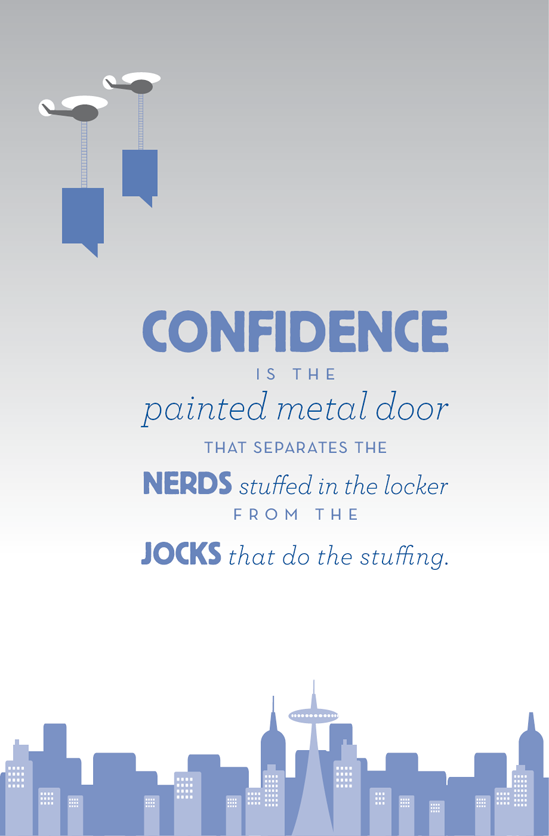Chapter 12. Chatterbox
Confidence is the painted metal door that separates the nerds stuffed in the locker from the jocks doing the stuffing. Having confidence is important—after all, you can't properly detain a nerd in a locker without that door—but knowing how to wield it is paramount. No one takes advice from a feeble advisor, but no one takes advice from an egomaniac, either.
I have withheld a simple truth regarding presentations that may undermine the burgeoning confidence of some novice presenters. This truth has to do with group-think, a phenomenon that happens when large numbers of otherwise manageable individuals come together as an audience to listen to you talk.
The bad news is that they all think they're experts. Not just on your subject matter, but on how they should be reached, what's funny versus what isn't, what constitutes an appropriate catering menu in late August, what a supposed expert keynote speaker (that's you) should wear, and so on. The masses are going to be judging you. I'm sorry; that's just the way it is.

The good news is—well, that actually depends. It may just end up being all bad news. Some presenters set out to own their audience in a way that is almost uncomfortably rooted in mind control. That, in a sense, is the good news: An audience is like a big knife, and group-think sharpens the edge, making it easier for many people to act at once. Where the cutting occurs—and exactly what is cut—well, that's entirely up to the speaker. Some presenters are uncomfortable with this sort of wide-scale puppetry, whereas others feel, for the first time, that they have finally arrived at a place in life where everyone listens as well as their stuffed animals did during childhood.
Okay, it isn't puppetry. But perception is nine-tenths of the law in presentations. If you control perception, you control outcomes. Since outcomes are based on the sum of the mental decisions that the audience reaches and acts upon during your presentation, you are, in a sense, controlling a large group of people's mental processes. Don't get a big head, but it's true.
Unfortunately, there is no Jedi hand wave that makes on-stage performing a walk in the park. Even more unfortunately, there is no little red flash, as in Men in Black, that can erase from your audience's memory any regrettable impressions you made during a talk. You have a beginning, middle, and end to your presentation. That which happens, happens: Success cannot be preemptively guaranteed, nor can it be regained after the fact. What remains, then, is the arduous task of actually becoming a good onstage presenter.
Obviously, we're dealing with a constant theme here: there is no substitute for hard work and actually being somebody worthwhile in the presentation world. Long-distance communication has experienced change after change, from the Pony Express to telephone lines to instant messaging to Skype. Journalism has gone from print to television to World Wide Web. Yet despite the unbelievable technological innovation that has characterized the past 50 years or so, presentations have more or less remained the same: They are delivered in person, plain and simple. Slide decks may be glossier, and design may be easier. But the barrier between a presenter and his or her audience was, is, and will always be made of air. It is one of the only forms of mass communication left where this is so.
In this sense, presentations are the last bastion of old school communications. Think of what old school means in other industries: no automation, no robotics, no computers, and no technological crutches. Just people and their big, clunky brains making things happen. I know we use technology in presentations (I address the latest capabilities in Chapter 13), but the overall scenario is decidedly quaint. It's a man-to-audience format that has persisted for thousands of years. Imagine the sort of day you'd be in for if you knew you were about to do some 1950s-style farming. With presentations, we often use the same tactics people have been using for decades, even centuries. Thus, it's time to roll up your sleeves.
The first thing any presenter needs to appreciate when considering the upcoming on-stage presentation is that he or she is an absolute chatterbox; that is, you never stop talking. Ever. I don't care if you're the most introverted, hermetic human ever to walk the planet: If you're going on stage, you are a chatterbox. I don't care if your modus operandi consists of standing mutely on stage while attempting to stare your audience into compliance and, after 45 minutes of silent staring, contracts are passed around for signing and the meeting is adjourned: You are a chatterbox. It doesn't matter what happens on stage; once there, we are all chatterboxes.
The reason is simple, and it goes back to the aforementioned inconvenient truth: the simple act of being in an audience has a way of making individuals bona fide experts in everything. They are looking at you, critiquing your every move: eye twitches, facial gestures, crooked tie, shiny shoes (or lack thereof), and so on. An audience member is just that: one member of a group of people. Anonymity has a way of minimizing introspection. Personal responsibility diminishes when individuals become part of a larger organism. The speaker, however, is clearly differentiated from the crowd. The speaker is a loner. The speaker is judged.
Think about it this way: Every individual carries a bucket of thoughts in their head. Hopes, fears, memories, anticipations, responsibilities; you name it, we think about it. However, when we join a group, we have implicit permission to stop focusing on ourselves. It is tribalism revisited—a return to archetypal antiquity. All of a sudden, the big, powerful brain is freed of the peculiar activities that govern 90 percent of its daily load. We're no longer thinking introspectively, because there is no I or me; there is we, the audience. So what happens with that 90 percent? We're still creatures of judgment—that never changes—and we still have the same brains, so it all comes down to one simple factor: What are we looking at? That is what we judge. That is what we do with our big brains. The on-stage presenter is on the receiving end of a vast amount of brainpower that has just been turned inside out.
The majority of presenters underestimate this psychological occurrence. They act as if it couldn't matter less what the state of a briefcase may be or the color of a tie. The attitude stems from democratic idealism: People should pay attention to my ideas, not me. People should base my credibility on past performance. You're right: They should. But unfortunately, they don't.
Managing perceptions in the public sphere comes naturally for some. I've met several presenters who get a real kick out of making a personal science of first and last impressions. Still others require a daily reminder just to tie their shoes in the morning. As with so many other areas, recognizing you have a problem is the first step on the road to recovery. I'm not saying there's anything wrong with you. There's just something wrong with your presentation approach if you fail to recognize and operate based on the importance of perception-management details.
Failing to practice your nonverbal delivery is the equivalent of getting on stage without a presentation outline, let alone having practiced. For some, the natural state of our nonverbal communications will do. This is sort of like being born 6′10″ with an excellent vertical leap: There's a good chance that you'll make a decent basketball player. Natural skill doesn't guarantee success, but it does provide a lot of the impetus behind it.

So, if you're naturally charismatic, congratulations. You're on your way to being a presentation god, and this chapter merely informs you of the things that you are already doing without really thinking about it. For the rest of us, this chapter provides the steps that we can take to bridge the gap between the gifted and the ordinary. Whereas we cannot make the decision to grow an extra foot and learn to jump twice our normal capability, we can stand in front of a mirror and watch our hands, and we can make a checklist of appropriate preparations for every on-stage opportunity and pragmatically check them off, one by one.
The best place to start is with the basics: hygiene and attire. The guiding logic is that no amount of smooth body language will overcome a stained burlap sack of a suit and greasy, reeking hair. Yes, it's social convention: You're being forced to comply with a set of arbitrary guidelines that tamp down on individualism across the globe. If this offends you, then I am so sorry—and your cabin in the woods awaits you.
Because I don't want any of you showering in your suits, let's look at hygiene first. Surely, you are already doing some of these things already. But you might be surprised at what can matter.
